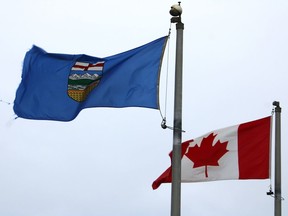Federal government advised to better engage with provinces over constitutional concerns: briefing note
"When provincial government adopt a resolution to amend the Constitution this ought to be assessed and addressed at the earliest possible juncture"

Article content
Civil servants warned the federal government to better engage with provinces, including Alberta, that are seeking to gain more constitutional autonomy citing a risk to national unity, according to an internal briefing note.
The document, titled Considerations for Ongoing Constitutional Issues, is marked as confidential, dated last Oct. 31, and is addressed to the clerk of the Privy Council Office, the head of the Public Service of Canada. It was obtained recently via an access to information request.
It summarizes the efforts by provincial governments in Alberta, Saskatchewan and Quebec to shape the constitutional division of powers, specifically the Alberta Sovereignty Within A United Canada Act, the Saskatchewan First Act, and Quebec’s Bill 21 and Bill 96.
Those pieces of legislation, the note observes, all share the objective of promoting a provincial identity distinct from the rest of Canada.
“These various approaches to shape the constitutional division of powers and discourse around Canadian federalism require careful consideration as they can affect the government of Canada’s ability to advance federal objectives and maintain a collective sense of belonging to Canada,” the note reads.
While the note acknowledges there is declining interest in opening the Constitution since the failed attempts of the 1980s and 1990s, it also cites how provinces were “coming up with a broader range of approaches to shape the Constitution, which includes more discreet amendments, litigation, and intergovernmental agreements to devolve powers.”
The note includes several comments from the Privy Council Office for consideration.
Those include stressing a need for the federal government to communicate with those provinces with what the authors term “prior and meaningful engagement.”
“When a provincial government adopts a resolution to amend the Constitution this ought to be assessed and addressed at the earliest possible juncture,” it reads.
“Doing so shows a consistent approach, avoids adding to a sense of alienation, and preserves the integrity of the Constitution.”
It goes on to caution that failing to do that “may invite even more creative and unexpected expressions of provincial discontent that may be damaging to intergovernmental relations.”
The note also warns of the potentially fracturing effects of taking jurisdictional disputes to court.
“Litigating these disputes contributes to the adversarial dynamic and makes compromise more difficult.”
It also advises against going around the provinces by appealing to big-city mayors who are often more politically friendly to Ottawa, stating that would likely be interpreted as challenging provincial jurisdiction.
“Federal attempts to directly engage urban mayors, without prior federal-provincial consultations, may exacerbate the resentment of provincial governments and rural municipalities.”
Mount Royal University political scientist Duane Bratt agreed that there’s a reluctance to reopen the Constitution, but adds that isn’t the goal of these provinces.
“All three provincial governments assert that they’re not actually changing the Constitution. They’re just asserting their rights under the Constitution.”
He said his biggest takeaway after reading the briefing note was that it was produced at all.
“They’re realizing that these are threats to national unity,” he said.
“They need to put them on the agenda of the federal government.”
Twitter @ByMatthewBlack









Postmedia is committed to maintaining a lively but civil forum for discussion. Please keep comments relevant and respectful. Comments may take up to an hour to appear on the site. You will receive an email if there is a reply to your comment, an update to a thread you follow or if a user you follow comments. Visit our Community Guidelines for more information.